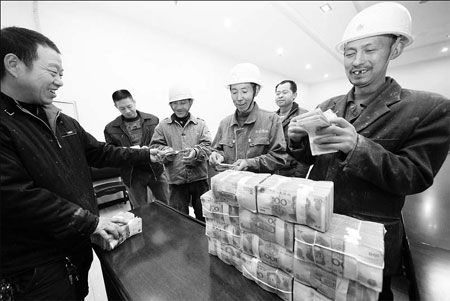Authorities to ensure workers get their payday ahead of festival
Updated: 2013-01-21 07:57
By Zhao Lei (China Daily)
|
||||||||
|
Migrant workers receive their pay at a construction site in Dazu district, Chongqing, on Dec 26. More than 150 workers at the site received a total of 2.2 million yuan ($350,000) of wages that day. Luo Guojia / for China Daily |
Labor authorities nationwide are keeping an eye on businesses that have been known to withhold wages to prevent thousands of migrant workers from being cheated before Spring Festival.
Officials have unveiled a variety of measures to ensure salaries are paid on time for the annual Lunar New Year holiday, including fines for bosses who are late and special funds to cover laborers left in limbo.
In Beijing, inspections by human resources and social security departments are focusing on the construction, catering and other labor-intensive sectors.
More than 560 employers have been punished for delaying salaries since December, and more than 48 million yuan ($7.62 million) in overdue salaries was paid out to almost 5,300 migrant workers, People's Daily reported.
Harbin, Heilongjiang province, has set aside 20 million yuan to pay workers who don't get paid this month. Law enforcement officers have been ordered to pressure offenders to pay up and pledged that all workers will get their money by Feb 3.
In Shijiazhuang, capital of Hebei province, five companies that were found in arrears have been blacklisted and banned from operating in the city.
The city government launched a campaign in November and has retrieved more than 47 million yuan in wages for 7,700 workers.
In Guizhou province, employers who default on the payment of more than 10 workers, delay paying for more than three months or are more than 100,000 yuan in arrears, will face a fine of up to 100,000 yuan, under regulations provincial legislators passed on Friday.
The regulation stipulates that enterprises in the construction, transportation and power generation businesses will have to deposit an amount of money in a government fund as a bond for worker's wages.
The precautionary measures follow a series of high-profile disputes that have drawn attention to the plight of laborers.
On Tuesday, two waitresses in their 20s attempted suicide in Dalian, Liaoning province, after their employer refused to pay their full salaries.
The women, both from Shanxi province, told police their employer would pay them only 600 yuan for 18 days' work, instead of the 2,000 yuan agreed upon.
They had gone to the labor supervision authority for help but were turned down because they did not sign contracts with the restaurant owner.
In Beijing, on Jan 14, about 140 migrant workers barged into a diplomatic residential compound on Chang'an Avenue to demand their salaries from a man who workers said hired them in Shandong province and had an office in the compound.
Almost 100 officers from the armed police division and public security bureau were dispatched.
Footage recorded by the Hong Kong-based Phoenix TV, shows officers standing in front of the gates persuading the workers to leave and trying to pull up some of the petitioners who were on their knees.
The deadlock lasted nearly three hours and ended when migrant workers were taken away in two buses.
In Nanjing, Jiangsu province, more than 30 construction workers blocked a bustling shopping street on Jan 7, demanding that their employer to pay them. Police officers rushed to the scene and promised to help resolve the issue.
After negotiations, a company that hired the workers' employer said it will pay a proportion of the workers' wages.
Feng Xiliang, a labor expert at the Capital University of Economics and Business, told China Daily there are many reasons companies withhold payment.
The construction sector, for example, "is prone to salaries in arrears because many subcontract jobs to smaller firms, which causes payment problems," he said.
"In some other industries, the grim economic situation and a sharp drop in export contracts have resulted in them being financially strapped, leading to their inability to pay workers in a timely manner.
"Yet, these should not be excuses for defaulting on workers' salaries," he added.
zhaolei@chinadaily.com.cn
(China Daily 01/21/2013 page4)

 In Photos: 7.0-magnitude quake hits Sichuan
In Photos: 7.0-magnitude quake hits Sichuan
 Li Na on Time cover, makes influential 100 list
Li Na on Time cover, makes influential 100 list
 FBI releases photos of 2 Boston bombings suspects
FBI releases photos of 2 Boston bombings suspects
 World's wackiest hairstyles
World's wackiest hairstyles
 Sandstorms strike Northwest China
Sandstorms strike Northwest China
 Never-seen photos of Madonna on display
Never-seen photos of Madonna on display
 H7N9 outbreak linked to waterfowl migration
H7N9 outbreak linked to waterfowl migration
 Dozens feared dead in Texas plant blast
Dozens feared dead in Texas plant blast
Most Viewed
Editor's Picks

|

|

|

|

|

|
Today's Top News
Live report: 7.0-magnitude quake hits Sichuan, heavy casualties feared
Boston suspect cornered on boat
Cross-talk artist helps to spread the word
'Green' awareness levels drop in Beijing
Palace Museum spruces up
First couple on Time's list of most influential
H7N9 flu transmission studied
Trading channels 'need to broaden'
US Weekly

|

|








